It Happens Every Spring

Brief Synopsis
Cast & Crew
Lloyd Bacon
Ray Milland
Jean Peters
Paul Douglas
Ed Begley
Ted De Corsia
Film Details
Technical Specs

Synopsis
Vernon Simpson is a young university chemistry professor working on his doctorate degree and is in love with the university president's daughter, Deborah Greenleaf. Vernon's department head, Prof. Forsythe, tells Greenleaf that upon completion of Simpson's degree, he intends to nominate him as director of a new research laboratory. Unknown to Forsythe, however, Vernon has a major flaw: every spring he becomes absentminded due to his intense interest in baseball. Debbie's father has made it clear to Vernon that, given his current financial situation, he should not be considering marriage to Debbie. However, Vernon tells Debbie that the situation may change very soon as a result of the experiment he is working on. Vernon has been developing a chemical compound to keep insects and other living matter away from wood, and has a major company interested in marketing it. His experimental setup is destroyed, however, after a baseball crashes through his lab window and lands in his chemical "soup" in the sink. When Vernon discovers that chemically coated ball is repelled by wooden objects, he realizes the enormous impact his find could have on the game of baseball. To verify his findings, Vernon arranges to have two student baseball players, Schmidt and Isbell, help him in exchange for additional tutoring. When Vernon throws a baseball that has been rubbed with a cloth soaked in the compound, it repeatedly jumps away from the swung bat and into the catcher's mitt. Although he cannot reconstitute the compound, Vernon immediately asks Prof. Greenleaf for an emergency leave of absence to demonstrate his findings, the details of which he does not reveal to Greenleaf. Vernon takes a train to St. Louis, heads for the baseball stadium and sees manager Jimmy Dolan. Although Vernon bills himself as the pitcher Dolan is in great need of, Dolan tries to have him thrown out. Club owner Stone, however, arranges for him to demonstrate his prowess, fully expecting him to be humiliated. Working with Monk Lanigan as his catcher, Vernon strikes out the team's top batters, and Stone realizes they have found a new star. After Vernon, who is playing under the name King Kelly, wins the first game he plays in against Chicago, he negotiates a lucrative contract with Dolan and Stone. Dolan assigns Monk to room with Vernon and keep an eye on him, as Dolan thinks Vernon is a "screwball." When Monk notices the bottle containing the chemical compound among Vernon's belongings, Vernon tells him that it is a prescription hair tonic. Vernon then reads a newspaper item reporting that he is missing and that a search has been initiated. After Vernon sends Debbie a diamond ring along with a vague letter asking her to have the police call off the search, Debbie's father thinks Vernon is probably mixed up with racketeers. Later, Debbie's mother spots Vernon at a railroad station in the company of a bunch of tough looking players and assumes they are gangsters. Vernon wins games in Pittsburgh, Philadelphia, Brooklyn and New York but has to insist that the press take no photographs of him. Meanwhile, Debbie reads a newspaper account about a gang robbing an exclusive jewelry store and removes her ring. When Vernon makes a payment on the ring, he bumps into Debbie, who accuses him of being a gangster. He confesses that he is now a baseball player but Debbie refuses to believe him. Vernon and his compound win every game for the team. One afternoon, Debbie attends a game and, through binoculars, recognizes Vernon. During the game, Monk, Vernon's regular catcher, injures a finger and has to have wooden splints applied to it, causing the ball not only to avoid the bat but Monk's hand as well. The team eventually wins the pennant and is scheduled to play against New York in the World Series, starting in St. Louis. Debbie tells her mother that Vernon is the new baseball sensation, and her father soon finds out the truth as well. Just before Vernon is to pitch the opening game, Dolan to whom Monk has loaned Vernon's bottle of "hair tonic," he returns it to Vernon and accidentally drops it. The bottle breaks, leaving Vernon with no compound to rub on the ball. With Debbie and her parents watching in the stands, Vernon struggles through the game and manages to win by catching a hit with his pitching hand. X-rays reveal that the hand is broken and that he will not be able to play any more. Monk sees Vernon off at the station then phones Debbie. A big crowd, led by Debbie, welcomes Vernon home. Dr. Greenleaf tells him that Stone has given the university money for a new research laboratory and that he will be appointed director.

Director

Lloyd Bacon
Cast

Ray Milland

Jean Peters

Paul Douglas

Ed Begley
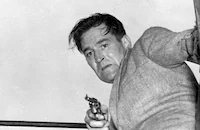
Ted De Corsia
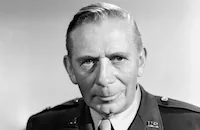
Ray Collins

Jessie Royce Landis

Alan Hale Jr.
Bill Murphy
William E. Green
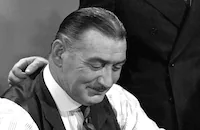
Edward Keane

Gene Evans
Ruth Lee
Jane Van Duser

Ray Teal
Don Hicks
Mickey Simpson
Johnny Calkins
Harry Cheshire
Harry Seymour
Robert B. Williams
Bob Adler
Charles Flynn
Ward Brant
John Mckee
Baird Allington
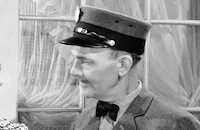
John Butler
Harry Carter
George Melford

Douglas Spencer
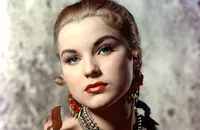
Debra Paget

Kathleen Hughes
Lee Macgregor
Joseph R. Liscio
Max Wagner
Brick Sullivan
Edwin Randolph
Pat Combs
Bill Cartledge
Frank "billy" Mitchell

Mae Marsh
Sam Hayes
Tom Hanlon
Crew
Jasper Blystone
Irene Brooks
Bonnie Cashin
Frank Cory Jr.
Hugh Cummings
Ike Danning
Valentine Davies
Valentine Davies
Doris Drought
Atillio Gabanni
Mack Gordon
Eugene Grossman
Charles Hall
Leigh Harline
Lillian Hokom
Charles Lemaire
Harry M. Leonard
Will Letters
Thomas Little
Joe Macdonald
C. W. Murphy
Josef Myrow
Lionel Newman
Ben Nye
William Perlberg
Bruce Pierce
Edward Powell
Stuart Reiss
G. Ross Robertson
Fred Sersen
Shirley W. Smith
Allan Snyder
Herbert Spencer
J. Russell Spencer
Anthony Ugrin
Jack Virgil
Lyle Wheeler
Darryl F. Zanuck

Photo Collections
Film Details
Technical Specs

Award Nominations
Best Writing, Screenplay
Articles
It Happens Every Spring
The man conducting scientific research in this case is Prof. Vernon K. Simpson (Ray Milland), a chemistry professor at a Midwestern college. Serious and energetic, Simpson knows that he must finish his doctorate and earn more money so that he can marry Debbie Greenleaf (the beautiful Jean Peters), a senior at the school who also happens to be the daughter of the college president, Prof. Alfred Greenleaf (Ray Collins). Prof. Simpson is somewhat older than Debbie he has been delayed in his studies by war service and by a string of "bad luck" but he is on the verge of discovering an important new compound a "biophobic" that will keep insects away from wood. A contract with a biochemical company will be financially rewarding enough that he could ask for Debbie's hand in marriage. The many months of his carefully crafted experiments are literally shattered, though, when a baseball slams through the window into his elaborate setup of beakers and Bunsen burners. A hodgepodge of mystery components collect in the lab sink, and when Simpson retrieves the soaked baseball, he discovers that it is repelled by wooden objects! He conducts a practical experiment on the school's diamond with jock students Schmidt (Alan Hale, Jr.) and Isabell (Bill Murphy) and discovers that, indeed, a dab of the solution hidden in his glove turns him into an unhitable big league pitcher! Simpson takes a leave of absence, travels to the training camp of the St. Louis ball club and convinces team owner Edgar Stone (Ed Begley) and manager Jimmy Dolan (Ted de Corsia) that he can win the Pennant for them. Under the name "Kelly" Simpson becomes their star rookie, but Stone and Dolan assign catcher Monk Lanigan (Paul Douglas) to keep his eye on the new pitching phenomenon.
It Happens Every Spring is a one-note trick film, to be sure, but the trick is a very good one, and the playing by the leads is winning and the situations feel genuine and are varied enough to maintain one's interest throughout. Several convincing, human details also make for a believable show. For example, when rookie Simpson is put into his first real game, a wild pitch lets the opposing team score a run. His nervousness continues as he throws several balls before he finally finds the plate. The always-interesting Ray Milland plays the baseball-loving professor as an earnest, determined character rather than a cartoon or an absent-minded cliché. Told he is thought of as a "screwball" by the ball club's front office, he insists that he is "quite the opposite everything I do is perfectly logical."
The laughs then proceed in a similarly natural fashion; catcher Monk is obviously rooting for the rookie he has been assigned to room with, and he has many of the best lines as he affectionately looks out for the new pitcher against opposing teams and the press. Monk also has his own run-ins with the solution; told by Simpson that the stuff is hair tonic, Monk uses it on his head and watches his hair dance a jig on its own to avoid a wooden brush!
The critic for Time magazine felt that the premise of the film was slight, although the movie ultimately worked for him: "Making baseball history is a cinch with the help of a moist pad concealed in the hollow of his pitcher's mitt. Every time his wood-repellent ball comes steaming across the plate, it takes a neat little hop over the advancing bat. ...With remarkable skill, this single-cylinder fantasy has somehow been kept in motion by director Lloyd Bacon (Mother Is a Freshman, 1949) and writer Valentine Davies (Miracle on 34th Street, 1947), who apparently have a gift for making a fairly funny movie out of a downright silly idea. Even so, without the sly comedy sense of veteran Milland and the pug-faced antics of Paul Douglas, Every Spring could easily have struck out in the second reel."
Bosley Crowther in The New York Times likewise finds the setup for the film to be one-note in nature, writing that "like a pitcher who has but one fast ball or one curve in his pitching repertoire, It Happens Every Spring... has but one cute idea. ...Somehow or other, [screenwriter Valentine] Davies and the people at Twentieth Century-Fox, which produced this hopeful little picture, made a woeful mistake. They assumed that the ludicrous spectacle of a batter swinging wildly at a ball which trickily dodges his bludgeon is funny innumerable times. They also assumed that a dumb catcher who doesn't comprehend the pitcher's trick can keep on killing an audience just by acting dumb. As a matter of fact, if anybody could make such a catcher bearable, that somebody is Paul Douglas and, fortunately, he plays the role. Mr. Douglas, who will long be remembered as the lummox in A Letter to Three Wives [1949], is delightfully droll for a short while, playing dubious, baffled and dumb. But finally the very dullness and monotony of the script puts even him in a bad light."
Critics aside, It Happens Every Spring performed fairly well at the box-office. The Variety year-end wrap issue of January 4, 1950 published a list of the top-grossing films of 1949. Of the 92 films that promised to gross $1,500,000 or more in domestic (including Canadian) film rentals, It Happens Every Spring ranked at number 58, with an estimated gross of $1,800,000. (For comparison's sake, the number 57 film on the list was White Heat, now one of the most highly regarded pictures from that year).
A little over a decade after It Happens Every Spring was released, Walt Disney Productions got into the habit of turning out shrill fantasy comedies with a sports angle, such as The Absent-Minded Professor (1961 basketball), Son of Flubber (1963 - football), and The Love Bug (1968 auto racing), but the slapstick in these films was broad and characters like Fred MacMurray's Prof. Brainard were gratingly absent-minded. Disney would have done better to try and emulate the more naturalistic charms of Prof. Simpson and his "baseball with a hop."
Producer: William Perlberg
Director: Lloyd Bacon
Screenplay: Valentine Davies (screenplay and story); Shirley W. Smith (story)
Cinematography: Joseph MacDonald
Art Direction: J. Russell Spencer, Lyle Wheeler
Music: Leigh Harline
Film Editing: Bruce Pierce, Dorothy Spencer
Cast: Ray Milland (Prof. Vernon K. Simpson), Jean Peters (Deborah Greenleaf), Paul Douglas (Monk Lanigan), Ed Begley (Edgar Stone), Ted de Corsia (manager Jimmy Dolan), Ray Collins (Prof. Alfred Greenleaf), Jessie Royce Landis (Mrs. Greenleaf), Alan Hale, Jr. (Schmidt), Bill Murphy (Tommy Isabell)
BW-87 min.
By John M. Miller

It Happens Every Spring
Quotes
Trivia
Notes
Shirley Wheeler Smith, the chief financial officer at the University of Michigan, originally wrote the short story used in this film for presentation at University Club festivities several years before it was published in the Summer 1946 issue of Michigan Alumnus. According to documents in the Twentieth Century-Fox Records of the Legal Department at the UCLA Arts-Special Collection Library, screenwriter Valentine Davies acquired all rights to the story in March 1947. Davies agreed to pay Smith fifty percent of all monies received, excluding his fee for writing a screenplay. In April 1948, Twentiethc Century-Fox bought a treatment Davies had developed from the story for $40,000. Davies was subsequently hired to write a screenplay, which then became the sole property of the studio. Davies retained publication rights to the treatment, however, and, incorporating material from the screenplay, produced a novel whose publication coincided with the film's release. Onscreen credits state that Davies wrote the screenplay "Based on a story by Shirley W. Smith and Valentine Davies."
A month before shooting was scheduled to start, (Ray Milland having been borrowed from Paramount), the studio encountered major problems with representatives of professional baseball. Despite the studio's numerous pleas, Commissioner Albert B. "Happy" Chandler, would not grant permission to use actual team names in the film as it was "the story of a cheat, winning a pennant and a World's Championship Series." The studio offered to include a foreword on the film that read: "The adventures of Mr. Vernon K. Simpson, the central character of this story, are purely imaginary. Because they violate both the rules of the game and the law of nature, the things he does are impossible and quite fantastic-like so many other things that happen every Spring." Chandler would not budge, and plans to feature professional players and famed announcer Red Barber were dropped as were names of specific teams and ballparks. However, Wrigley Field in Los Angeles was rented for the game sequences at $525 per day and the University of Southern California received a donation of $250 per day for use of its Bovard Field. A street sequence was shot in Santa Monica, CA, and other exteriors were filmed at USC.
The final Hollywood Reporter production chart, on January 21, 1949, lists Dorothy Spencer as film editor, although Bruce Pierce is credited onscreen in that capacity. The extent of Spencer's contribution to the final film is not known. Actors Al Eben, Grandon Rhodes and Robert Patten are listed in the Variety review and studio cast lists but their appearance in the released film is doubtful. It Happens Every Spring received an Academy Award nomination for Best Motion Picture Story. A radio adaptation of Davies' script, starring Ray Milland, William Bendix and Coleen Townsend, was broadcast on Lux Radio Theatre on October 3, 1949. Another version was broadcast on Screen Directors' Playhouse on April 14, 1950.

Miscellaneous Notes
Released in United States July 1984
Released in United States Summer June 1949
Released in United States Summer June 1949
Released in United States July 1984 (Shown at FILMEX: Los Angeles International Film Exposition (50 Hour Sports Movie Marathon) July 5-20, 1984.)














